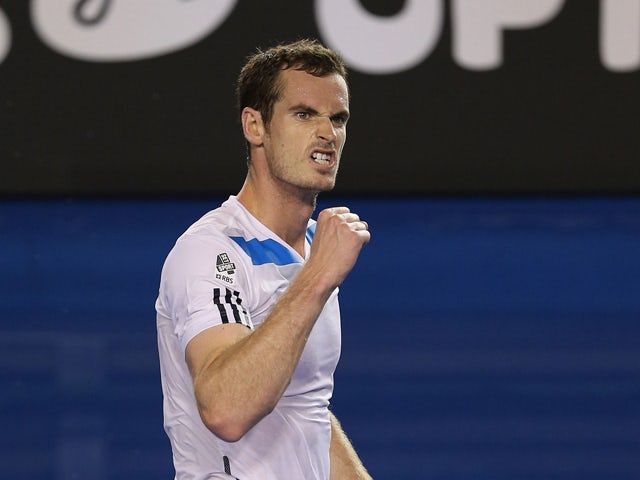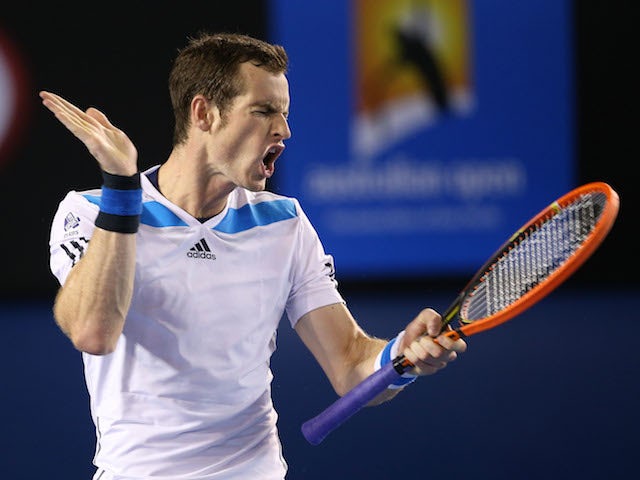When Andy Murray underwent back surgery late in September last year, he immediately made it known that his participation at the Australian Open was by no means a certainty, and that he wouldn't rush his return from the operation.
The signs were good when the Wimbledon champion returned to action during an exhibition tournament in the Middle East, but an early loss in Doha suggested that the Scot wasn't quite at the top of his game and that he was lacking his usual match sharpness.
He arrived in Melbourne as an obvious contender for the title, but after losing to Roger Federer after making the quarter-finals with ease, can Murray be content with his start to 2014?
When the draw was made in Melbourne, there was no doubting that it had been kind to Murray, who had been handed the opportunity to ease himself into the tournament with matches against Japanese player Go Soeda and an unknown qualifier.
However, the heat was expected to be a factor in Australia, with temperatures anticipated to reach record highs, and fears of unbearable and unplayable conditions soon came into effect when temperatures soared in excess of 40C for Murray's opening match.
 © Getty Images
© Getty Images
Murray was never expected to lose to a player outside of the top 100, but all eyes were on the back, and he endured no complications with the repaired area or with his performance as he coasted past Soeda in straight sets.
Much of the same was expected against world number 264 Vincent Millot, but Murray's display was in sharp contrast to that of two days previous. He looked horribly out of touch and he lacked a competitive edge, despite sailing through the first two sets for the loss of just four games.
The Scot found himself 5-1 and a set point down in the third before achieving the remarkable statistic of winning 23 consecutive points, just two shy of the all-time record. However, it papered over the cracks, and Murray needed to deliver an improved outing to negotiate himself past the big-serving Feliciano Lopez.
The Spaniard was expected to cause Murray plenty of trouble, but Murray looked back to his best against the left-hander, coming through in three sets to set up a last-16 encounter with 33-year-old Frenchman Stephane Robert.
The veteran nicked the third set off the world number four, but Murray was never in danger of failing to move through to a quarter-final showdown with Federer, who was showing signs that he was approaching the kind of form that had seen him win 17 Grand Slam titles.
 © Getty Images
© Getty Images
The uncertainty surrounding Murray's capability to hang tough with the former world number one saw him enter the contest as the underdog, which was considered a surprise by some given Murray's slender lead in the head-to-head meetings between the two.
However, it quickly became apparent that Murray was dealing with a different animal than in their most recent meetings. The Swiss was ruthless at the net, consistently forcing Murray onto, the defensive which enabled him to open up a two-set lead over the Scot. It seemed a foregone conclusion that the match would be wrapped up in straight sets.
But what transpired over the next hour-and-a-half is what will leave Murray and his supporters with a feeling of satisfaction, despite his exit from the tournament. After failing to create a break point in two hours of play and with Federer serving for the match, it looked a formality for the Swiss until Murray roared back to level the set and take the action into a tie-break.
The writing was on the wall when Federer created two match points, but again, Murray displayed the fighting spirit that he had become known for during his nine years as a professional, and four points later, he had pulled a set back.
The fourth didn't go to plan, and Federer eventually sealed victory, but arguably the most pleasing aspect of the match was Murray's back standing up to a 20-minute service game that saw him save six break points. The deuce count ran into double figures, but the Scot came out at the other end grimacing in pain but smiling inwardly that his back had passed the severest of tests.
Murray's failure to defend the points achieved for reaching the final last year will have a detrimental effect on his world ranking, but the two-time Grand Slam winner goes into the coming weeks with a growing sense of optimism, and while he faces a fight on his hands to reclaim a spot in the top three in the world, he will relish the challenge of proving himself throughout the remainder of 2014.







